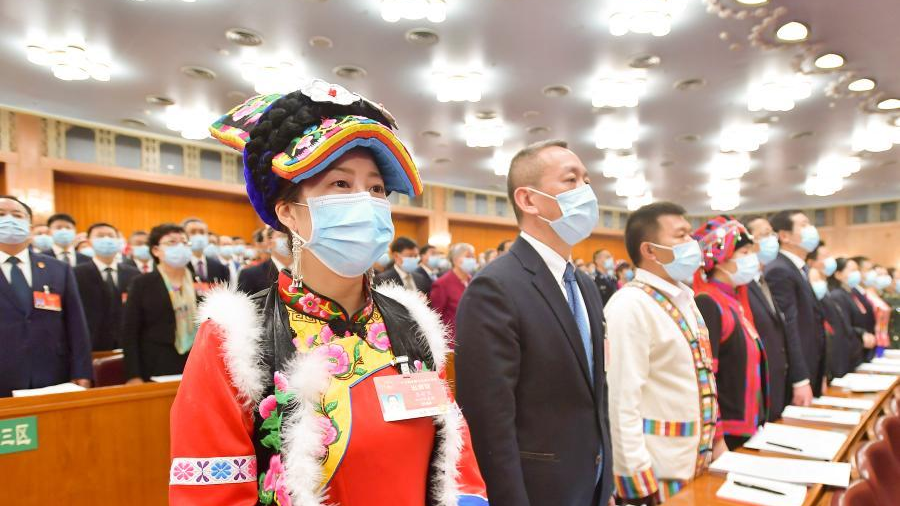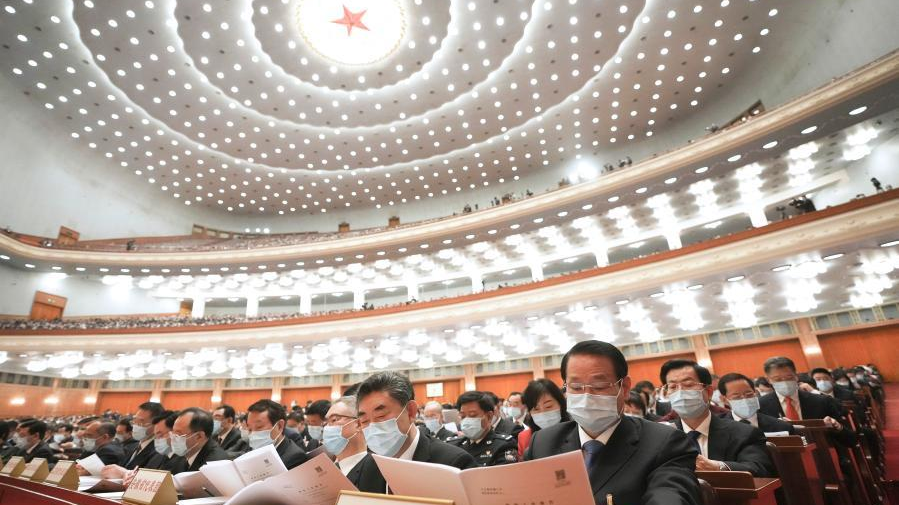
The fourth session of the 13th National People's Congress (NPC) of China opens at the Great Hall of the People in Beijing, March 5, 2021. /Xinhua
The fourth session of the 13th National People's Congress (NPC) of China opens at the Great Hall of the People in Beijing, March 5, 2021. /Xinhua
Editor's note: Timothy Kerswell is a research fellow at the Chinese University of Hong Kong (Shenzhen). He lived in Macao for seven years, working as an assistant professor at the University of Macao. The article reflects the author's opinions and not necessarily the views of CGTN.
Chinese Premier Li Keqiang delivered the all-important government work report at the National People's Congress in Beijing, with the key issues emerging as economic growth, employment creation, healthcare, demographic policy and social security reform. While the report set numerous ambitious targets, its tone was the promotion of high-quality growth, intending to closely link this growth to the achievement of key social objectives in meeting the needs of the Chinese people.
Perhaps the most eye-catching factoid in the report is the return of the Gross Domestic Product (GDP) target at "above 6 percent." In 2020, China had not set a GDP target due to the destabilizing impacts of the COVID-19 pandemic. There was significant speculation that this could be repeated in 2021. By setting this target, Premier Li has indicated that China believes it is in a post-pandemic situation, even if the impacts of the COVID-19 pandemic still hamper the international economy.
With China being the only major economy to grow in 2020, in many respects, the global recovery will depend on China's overall economic performance. However, a close look at the work report indicates China is increasingly less worried about GDP as an economic measure, with greater emphasis being given to quality measures like industrial modernization, rural revitalization and innovation.
China's understanding of the role of economic development does not fetishize the economy beyond its ability to serve human needs. This can be seen in Premier Li's comments, "We will give even greater priority to serving the real economy, and balance the needs of promoting economic recovery and preventing risks." One of the main reasons for this is to generate domestic employment. In 2020, China created 11.86 million urban jobs despite the challenges of the pandemic.
The Work Report set the target of creating another 11 million urban jobs in an international environment complicated by the COVID-19 pandemic. China has typically exceeded its employment growth targets, even in 2020 when the target was set at 9 million. However, uncertainty about the impact of the mismanagement of COVID-19 in many major economies and the impact this will have on their recovery most likely led to a more conservative goal.

Deputies to the 13th National People's Congress (NPC) of China attend the opening meeting of the fourth session of the 13th NPC at the Great Hall of the People in Beijing, March 5, 2021. /Xinhua
Deputies to the 13th National People's Congress (NPC) of China attend the opening meeting of the fourth session of the 13th NPC at the Great Hall of the People in Beijing, March 5, 2021. /Xinhua
Demographic policy was a significant focus of the report. It is expected that there will be comprehensive policy announcements in the months to come with China placing significant emphasis on its aging population. Premier Li noted, "We will implement the national strategy for addressing population aging, and improve the population services system with a focus on elderly care and child care. We will work to achieve an appropriate birth rate."
On the other end of the demographic spectrum was an announcement of a likely increase in the retirement age and a target of an additional year of life expectancy by the end of 2021. The policy initiative of a healthy China was announced with an emphasis on further developing the strength of China's public health system, as well as policy measures to promote health and fitness.
Considering that the average developed country's life expectancy in 2020 was 79 years, that China as a developing country has reached an average of 77.3 years, it is clear that the government has made closing this gap a top priority.
As China changes, there are indications that certain long-held concepts are going to change with it. The announcement of a phased increase in the retirement age is undoubtedly a major one, given that China's retirement age has not changed in over 40 years. In step with the likely retirement age increase and economic and demographic targets, Premier Li indicated a range of social policy factors would be addressed in 2021.
An important one is the improvement of the social security system, especially by strengthening the old-age insurance scheme's coverage to 95 percent of the population. In every respect, the report reflects China's commitment to the planned development of its economy and society and the strong emphasis on directing China's development to improve its people's welfare.
(If you want to contribute and have specific expertise, please contact us at opinions@cgtn.com.)

